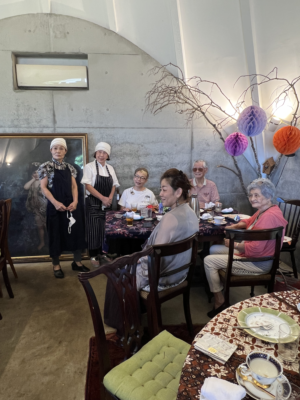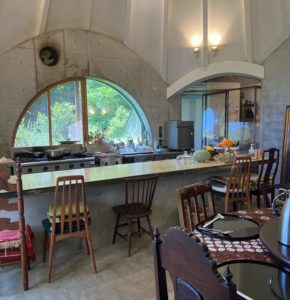
July 2022
We interviewed two older Japanese women who had moved from Tokyo to Izu Highland, a popular retreat for city dwellers, to build their private house and restaurant. They contribute to building a community by serving lunch and delivering meals to local residents.
Nobuko (age 73) and Sachiko (age 65) are long-time friends as well as former colleagues at a sheltered workshop for people with psychiatric disabilities in Tokyo, delivering meals to older adults in their community. Seven and a half years ago, they built a house/restaurant called “Jikka House” in Izu Highland, a popular retreat for city dwellers with nice weather, planning to relax and enjoy their later lives. Since they both love cooking, they also wanted to interact with their new neighbors through meals.
While the Japanese word “Jikka” literally means “the house I was born in,” they translate it as “where my heart belongs.” The unique teepee-shaped Jikka complex was designed by an architect who is also Nobuko’s son. It has a number of innovative features to enhance accessibility, including a spiral-shaped wheelchair-accessible bath, to enable the residents to stay there even when they start needing care. International media, such as CNN and BBC, featured Jikka House before Japanese media and attracted global interest.
These two friends deliver dinners to local residents, mainly older adults, on Saturdays, and open their house for lunch on Thursdays and Fridays. Since Nobuko decides the menu every time after purchasing ingredients at a local market, no one knows what will be served on that day. According to Nobuko, “meals at Jikka are homemade but with some extra time and efforts.” They, therefore, start preparing for lunch at 4 a.m. Their homemade meals are plentiful, global, and colorful, mostly made with locally grown organic vegetables, fish, and meat.
With no thought of profit, they serve generous three-hour lunch from an appetizer to dessert. Although they don’t use anything such as social media and a website to advertise their services, both the home-delivered meals and restaurant have been attracting more customers and users through word of mouth. The community has a mixture of old and new residents. In particular, Izu Highland attracts a number of artists moving from urban areas, partly because of an art festival organized there every May. The Jikka restaurant sometimes serves as a venue for art workshops.

Jikka is becoming a community hub, bringing people together and helping cooperative relationships grow among local residents. Nobuko and Sachiko hope that Jikka will eventually become a de-facto day care center.
Their greatest joy comes from doing what they like to do at the place they like for people they like, and being appreciated for what they do. They therefore do what they can do without pushing themselves too much. They also cherish customers’ talent by having them display their works and offering the space for workshops. One customer, an 87-year-old man, has some difficulty walking. But he walks up the slope to this restaurant to enjoy Jikka’s delicious meals.
Since Jikka House makes you feel as if you entered a fairy tale home, people coming to this place are also dressed nicely. It is indeed the embodiment of productive aging. The beautiful smiles of the local residents we interviewed were quite striking.
The restaurant only serves a full course lunch, including six dishes, homemade bread, dessert, and coffee/tea (2,100 yen, including tax). Reservations required.
https://www.youtube.com/watch?v=cpmPuzTyIZE
https://www.youtube.com/watch?v=Rb9vAFEXtRk
Contact the ILC-Japan:
E-mail: ilcjapan@ihep.jp
Website: www.ilcjapan.org/english.html
Dynamic knowledge synthesis in local networks for coherent elderly care
We are getting older and more diverse, and that brings challenges. We cannot solve these challenges through healthcare alone. We also need municipalities, schools, companies, housing associations and older people themselves to achieve an age-friendly society. This requires cross-domain collaboration. But how can we achieve that?
25 April 2024
Event summary – Healthy ageing and longevity in Europe: How do we prepare for the 100-year life?
In partnership with ILC-UK, the ILC Europe Network hosted its inaugural conference in Brussels on 6 March 2024 to explore the challenges and opportunities associated with an ageing European society. Other ILC Global Alliance members in attendance included ILC-Czech Republic, ILC-France and ILC-Netherlands.
March 2024
White paper Arts in Health in the Netherlands: Art deserves a prominent place in healthcare
Much more attention needs to be paid to the positive effects of the use of art in healthcare. Art makes people feel better and helps them to better cope with their illness. Art can also mean a lot in the social domain and prevention, and in shortening hospital admissions.
February 2024


